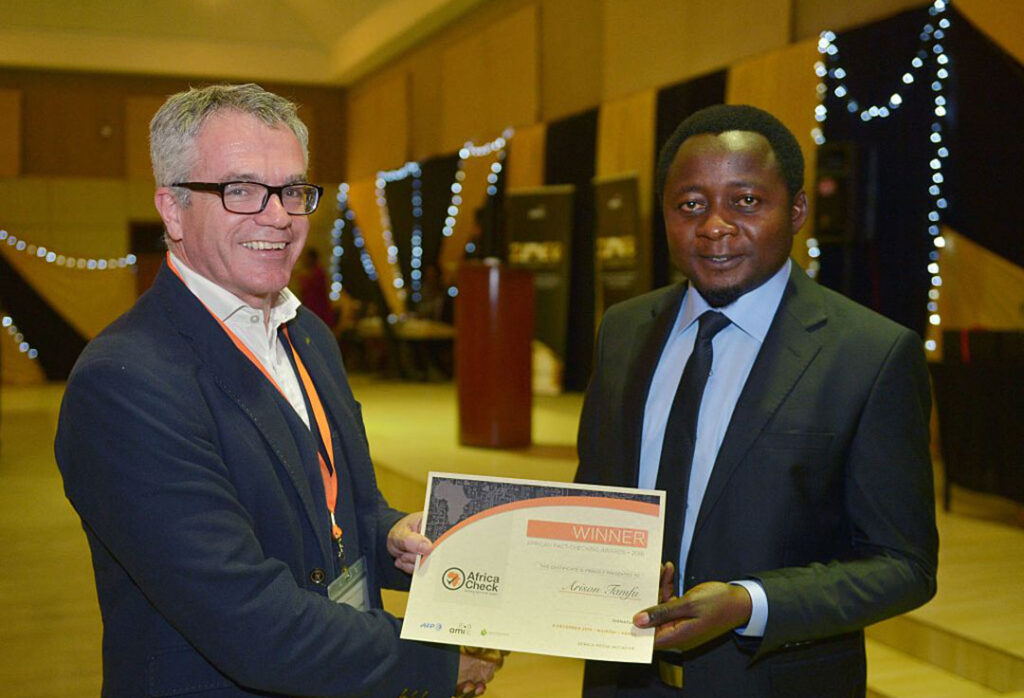ADF STAFF
Several months before the first news of COVID-19 broke, Peter Cunliffe-Jones delivered the keynote speech at the 2019 Global Fact-Checking Summit in Cape Town, South Africa.
“Fighting misinformation is like fighting a virus,” he said. “Fact-checking is a vaccine.”
A year later, Cunliffe-Jones, the founder of nonprofit fact-checking service Africa Check, has seen all too clearly how the figurative disease of misinformation can help spread an actual disease.
“Misinformation is not one problem; it’s many,” he said. “It’s a problem of false information. It’s a problem of lack of access to and trust in reliable information. It’s a problem of how we understand our world. False information causes harm depending on the context.”
The pandemic has brought forth an avalanche of falsehoods, lies and misleading information. Rumors and conspiracy theories circulated almost immediately around the cause of the virus, unproven treatments and more recently, anti-vaccine claims.
It aids the spread of COVID-19, while hindering governments’ responses and eroding public trust.
Africa Check launched in Johannesburg in 2012 after winning a news innovation contest sponsored by Google. The continent’s first independent fact-checking organization is now an essential tool in the battle against the COVID-19“infodemic,” defined by the World Health Organization (WHO) as an “overabundance of information, both online and offline.”
In early December, Africa Check joined a new WHO initiative called the Africa Infodemic Response Alliance, a team of 13 international and regional organizations and fact-checking groups that track and correct misinformation.
“At Africa Check we are acutely aware that we cannot do it alone; collaboration is crucial,” Lee Mwiti, Africa Check chief editor, said in a statement. “We are keen to be part of this multistakeholder alliance.”
Africa Check also is participating in an effort by the charity Full Fact that brings together Facebook, Twitter, YouTube and a host of other fact-checkers, researchers and governments to find new ways to uniformly combat misinformation.
Mwiti also lists WhatsApp, a popular messaging platform in Africa, as an especially difficult issue for fact-checkers. The app’s encrypted closed network makes it hard for Africa Check to evaluate the spread of falsehoods and counter them.
Earlier this year Africa Check launched a podcast called “What’s Crap on WhatsApp” that grew from 1,718 subscribers in January to 5,413 in June. The nonprofit also debuted a chatbot on the app named Kweli, which corrects or verifies information sent by users.
Africa Check is involved in many more projects devoted to battling the spread of false news.
- It partners with the University of Johannesburg’s Africa Centre for Evidence to research the spread of COVID-19 misinformation.
- It hosts workshops to train journalists from around the world, including students in Africa.
- It is creating a group of “Fact Ambassadors” to disseminate fact-checks, guides and media literacy material to peers on their social media networks.
“Working together to tackle misinformation around the pandemic is critical, particularly as we move closer to the availability of viable vaccines,” United Nations Undersecretary General for global communications Melissa Fleming said in a statement for the launch of the alliance.
“We know that misinformation can cause serious harm and undermine trust in medicine and science when it matters the most, ultimately hindering any public health efforts to end the pandemic that continues to needlessly claim so many lives across Africa.”

